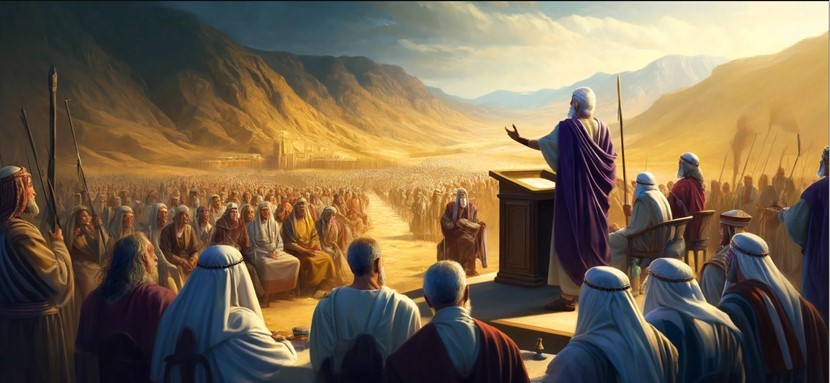Good morning!
Greetings in the name of the Father, the son, and the Holy Spirit.
Have I not commanded you? Be strong and courageous. Do not be frightened, and do not be dismayed, for the Lord your God is with you wherever you go. (Joshua 1:19)

Imagine the scene: a vast assembly under the expansive skies of a land rich with the echoes of battles fought, promises fulfilled, and miracles performed. Here stands Joshua, a venerable leader marked by the passage of many challenging years, his eyes reflecting a depth of wisdom and experience gained through a lifetime of service. As he nears the conclusion of his earthly journey, Joshua calls together the leaders of Israel for one final, monumental address. This gathering is not just a routine meeting; it is a significant ceremonial moment, heavy with the weight of impending transition and the poignancy of an era’s end.
Joshua’s address to the assembly is charged with urgency and fervor. He does not simply recount the victories that have defined their conquests nor does he merely celebrate the fulfillment of divine promises. Instead, his speech is imbued with a profound sense of duty and concern for the future. It is a fervent plea aimed at ensuring the continued faithfulness and unity of his people. As recorded in Joshua 23, this poignant moment offers not just historical insight but deep spiritual lessons on leadership, legacy, and the sustaining power of faith. This scenario, set against the backdrop of the lands they have fought so hard to claim, frames a narrative that is as much about reflecting on God’s past faithfulness as it is about looking forward to maintaining fidelity to those divine promises.

The Importance of Remembering
In his farewell address to the leaders of Israel, Joshua begins by recounting the extraordinary journey they have embarked upon together—a journey marked not by mere human effort but by the unmistakable hand of divine intervention. Standing before his audience, Joshua reminds them, “You yourselves have seen everything the Lord your God has done to all these nations for your sake; it was the Lord your God who fought for you” (Joshua 23:3). This initial statement sets the tone for his message, emphasizing that their victories over formidable adversaries and their possession of the land were not achieved through their prowess or strategic acumen but through the power of their God.
Joshua’s recounting of past victories serves a pivotal purpose in his speech. It is more than a mere historical summary; it is a strategic reinforcement of faith and commitment among the leaders. By reminding them of how they witnessed God’s power and faithfulness, Joshua reinforces the collective memory of God’s interventions, which is crucial for sustaining the community’s faith and collective purpose. This recollection is intended to anchor them in their identity as a people chosen and led by God, bolstering their confidence as they face the uncertainties of the future.
Moreover, Joshua’s reminder is a call to continued obedience and loyalty to God. He uses the recount of past divine acts as evidence of God’s ongoing commitment to His people, implying that their future success and security are contingent upon their fidelity to His commands. As he further instructs them, “Be very strong; be careful to obey all that is written in the Book of the Law of Moses, without turning aside to the right or to the left” (Joshua 23:6). This directive links their past experiences with their current and future conduct, highlighting that remembering God’s past deeds is foundational for navigating present and future challenges.
This emphasis on the importance of memory in sustaining faith is deeply embedded in the spiritual life of Israel. It is a theme that recurs throughout the scriptures, reflecting a broader biblical principle that God’s past faithfulness serves as a guarantee for future provision and protection. As seen in the Psalms, the act of remembering and recounting God’s works is a frequent call to strengthen faith: “I will remember the deeds of the Lord; yes, I will remember your miracles of long ago” (Psalm 77:11).
Joshua’s message to the leaders underscores the power of collective memory not only to foster a sense of unity and continuity among the people but also to fortify them against the temptations and challenges they would continue to face in the land. By anchoring them in the memory of God’s faithfulness, Joshua seeks to ensure that the community’s future actions are aligned with the covenantal relationship established with God. This alignment is crucial for the welfare and survival of Israel as a nation dedicated to serving and worshiping God according to the laws given to Moses.
In conclusion, Joshua’s opening remarks in his farewell address function as a powerful reminder of the source of Israel’s strength and success. They serve as a call to remember and rely on God’s guidance and protection, reinforcing the community’s faith and commitment. This lesson transcends time and continues to resonate, encouraging us to reflect on our own life’s journey, recognize the divine assistance in our past, and allow those memories to guide and strengthen our faith as we move forward.

The Call to Unwavering Faithfulness
As Joshua’s address to the leaders of Israel progresses, he shifts from a reflective recounting of past divine interventions to a forceful exhortation and a solemn warning. He implores the leaders to deepen their commitment to God, emphasizing the critical need for fidelity and obedience. His words resonate with a sense of urgency: “But be very careful to keep the commandment and the law that Moses the servant of the Lord gave you: to love the Lord your God, to walk in all his ways, to obey his commands, to hold fast to him and to serve him with all your heart and all your soul” (Joshua 23:6). This directive forms the core of Joshua’s message and serves as a vital instruction for maintaining the covenant relationship with God, which is crucial for the continuation of the blessings they have enjoyed.
Joshua’s call to faithfulness is fundamental, underscoring that genuine faithfulness involves more than mere adherence to rituals; it demands a wholehearted commitment to live according to God’s laws. It is an active, daily decision to align every aspect of one’s life with divine directives, embodying the principles laid out in the Law of Moses. This comprehensive approach to obedience involves loving God, walking in His ways, and serving Him with an undivided heart and soul, reflecting a life wholly dedicated to divine service.
The emphasis on obedience is rooted in the understanding that the blessings Israel has experienced—the land, peace from enemies, and prosperity—are contingent upon their continued loyalty to God. This principle is echoed throughout the Bible and is particularly articulated in Deuteronomy 28, where blessings are promised to those who obey God’s commands, and curses to those who stray from them. Joshua’s warning is therefore not just about maintaining religious or cultural identity but about securing their future under God’s protection and favor.
Moreover, Joshua’s admonition to “hold fast” to God highlights the necessity of perseverance in faith. This call to cling tightly to God’s commands in the face of temptations and challenges is crucial for the leaders. It serves as a reminder that their leadership must be rooted in a steadfast commitment to God’s statutes, setting an example for the people they govern. This adherence ensures that the nation does not stray from the covenantal path, thus safeguarding their collective well-being.
Joshua’s exhortation also serves as a prophetic warning. He outlines the dire consequences of failing to uphold the covenant: “If you turn away and ally yourselves with the survivors of these nations that remain among you and if you intermarry with them and associate with them, then you may be sure that the Lord your God will no longer drive out these nations before you. Instead, they will become snares and traps for you, whips on your backs and thorns in your eyes, until you perish from this good land, which the Lord your God has given you” (Joshua 23:12-13). This stark warning about the potential for spiritual and physical peril underscores the serious nature of their covenant with God and the absolute necessity of unwavering faithfulness.
In summary, Joshua’s speech highlights the indispensable role of obedience in maintaining the health and future of the Israelite community. His poignant message to the leaders serves as a timeless reminder that faithfulness to God is not passive but requires a proactive, enduring commitment that must be lived out daily. It calls for a life fully aligned with God’s will, demonstrated through consistent obedience and a resolute commitment to uphold divine laws as the foundation for a blessed and secure community.
The Dangers of Complacency
As Joshua’s farewell address to the leaders of Israel continues, he articulates a profound understanding of human nature and the pitfalls that often accompany seasons of peace and prosperity. With a tone of solemn warning, he addresses the potential dangers of complacency and the consequences of deviating from their commitment to God. Joshua is acutely aware that the absence of immediate external threats can lead to a false sense of security, allowing internal moral and spiritual decay to set in. He cautions the leaders, emphasizing the pernicious risks of intertwining too closely with the surrounding nations whose cultural and religious practices could undermine the Israelites’ covenant with God.
Joshua explicitly warns, “If you turn away and ally yourselves with the survivors of these nations that remain among you and if you intermarry with them and associate with them, then you may be sure that the Lord your God will no longer drive out these nations before you. Instead, they will become snares and traps for you, whips on your backs and thorns in your eyes, until you perish from this good land, which the Lord your God has given you” (Joshua 23:12-13). This vivid imagery not only portrays the physical dangers of such alliances but also symbolizes the spiritual and moral corruption that could ensnare them, leading to their downfall.
Joshua’s admonitions are grounded in the historical context of Israel’s covenant relationship with God, which demanded exclusivity in worship and a distinct way of life as set apart by the laws given to Moses. The directive against forming such entanglements with remaining local nations was not merely about maintaining cultural purity but fundamentally about preserving their unique identity as God’s people, devoted to His worship and purposes. This covenant relationship required them to resist assimilating practices that contradicted their foundational religious commitments.
The risk of diluting their faith through such associations is a recurrent theme throughout the biblical narrative. Similar warnings are echoed in other parts of scripture, such as in 2 Corinthians 6:14, where Paul advises, “Do not be yoked together with unbelievers. For what do righteousness and wickedness have in common? Or what fellowship can light have with darkness?” These admonitions across the testaments highlight a universal and timeless truth about the nature of spiritual fidelity and the dangers posed by incompatible alliances.
Joshua’s message also serves as a broader metaphor for the subtle ways in which any community or individual might drift from core principles if not vigilant. The dangers of complacency and the seduction of compromising for short-term convenience or acceptance can lead to long-term consequences. This cautionary tale reminds us to continually assess the influences we allow into our lives and to be deliberate in maintaining commitments to our God in faith.
In conclusion, Joshua’s warnings in his farewell address underscore the necessity of vigilance in maintaining spiritual and moral integrity. He challenges the leaders, and through them, all future generations, to remain faithful to their commitments, wary of influences that might lead them astray. This part of Joshua’s speech is not only a directive for his immediate audience but also a perennial lesson on the importance of safeguarding one’s values against the erosive effects of complacency and cultural assimilation. It calls for a proactive stance in nurturing and protecting the spiritual heritage and commitments to God that define and sustain a community.
Summary
Joshua’s farewell address to the leaders of Israel serves as a profound culmination of his leadership, encapsulating the core values that guided his tenure—unyielding commitment to God, constant remembrance of God’s past faithfulness, and vigilant warnings against complacency. As he stood before his successors, Joshua did not merely recount the triumphs and trials they had endured; he also set forth a blueprint for maintaining their covenant with God in future generations. His speech underscores the crucial link between remembering God’s past provisions and maintaining fidelity to His commands.
In his address, Joshua emphasizes the importance of historical memory as a tool for spiritual resilience. By urging the leaders to recall the miraculous ways in which God had enabled them to conquer the land, he reinforces the necessity of anchoring their future actions and decisions in the faithfulness God demonstrated in the past. This call to remembrance is not just about honoring history but is a strategic appeal to fortify their commitment and to prevent the erosion of faith that can occur in times of peace and prosperity.
Moreover, Joshua’s stern warnings against complacency and the lure of cultural assimilation speak directly to the perennial challenge of remaining faithful amidst changing circumstances. He highlights the dangers of drifting from their foundational beliefs, which could lead not only to personal but to national ruin. This part of his discourse reminds us that vigilance in faith is not a passive stance but requires active engagement and discernment, especially as new challenges arise.
As we reflect upon Joshua’s address, we are prompted to consider our own legacies—how we will be remembered and what foundational truths we will leave behind for those who follow. His words encourage us to evaluate the steadfastness of our own commitments and to ponder the influence of our lives on future generations. Will we, like Joshua, be remembered for our unwavering faithfulness and our dedication to upholding and transmitting core values? Will our legacies inspire others to hold fast to their convictions, even in the face of societal pressures and temptations?
In summary, Joshua’s farewell address not only marked the conclusion of his leadership but also provided timeless guidance on the importance of memory, the necessity of faithfulness, and the dangers of complacency. His counsel to the leaders of Israel resonates across the ages, offering enduring wisdom for anyone who seeks to navigate the complexities of maintaining faith and integrity in a changing world.
Heavenly Father, we thank You for the enduring lessons taught by Your servant Joshua. Help us to remember the journeys You have brought us through, to remain steadfast in our faithfulness, and to be vigilant against complacency. May we lead lives that honor You, building legacies that testify to Your unfailing love and truth. Strengthen us to be leaders in our own right, walking in Your ways and teaching others to do the same. We pray in the name of Jesus Christ, Our Savior, Amen.

Israel served the Lord all the days of Joshua, and all the days of the elders who outlived Joshua and had known all the work that the Lord did for Israel. (Joshua 24:31)
